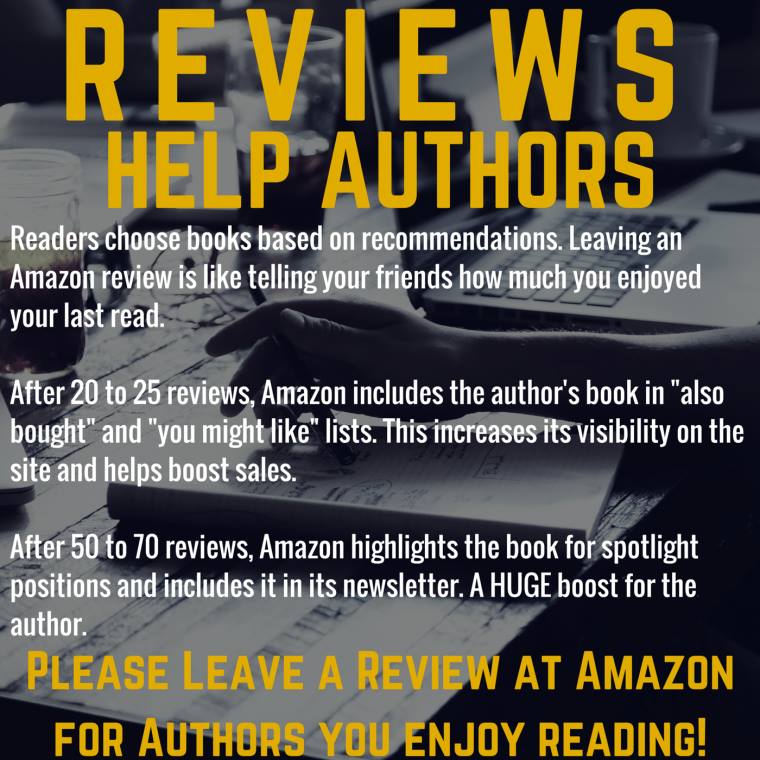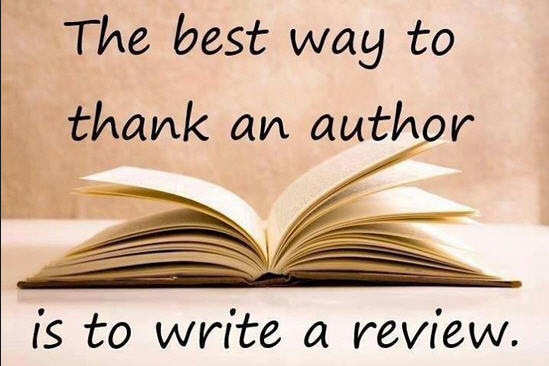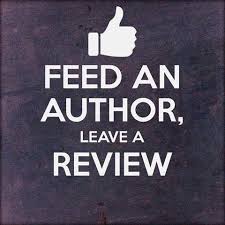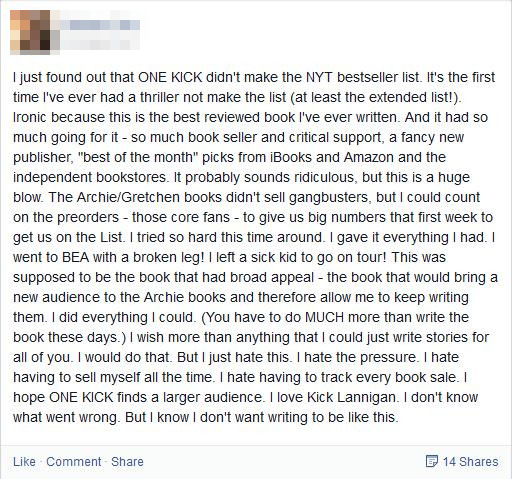There have been a few graphics going around social media lately that kind of rub me the wrong way.
In the past, this sentiment never bothered me. I may have even expressed it a time or two. But I’m seeing an increase in readers speaking out about this practice. Now, from a reader’s point of view, I’m starting to see why this is frustrating.
Imagine going to see a movie. It’s a fun movie, you enjoyed it. You left the theatre feeling you got your money’s worth. Then, when you got home, the director has posted a Facebook message: “If you want us to be able to keep making movies, please consider writing a review at Rotten Tomatoes or IMDB.” How would that make you feel? Pressured? Guilty? Obligated? Maybe you wouldn’t go see a movie directed by that guy again, because you don’t want to deal with the plea for reviews.
What if you went to Home Depot and bought a new plunger? You brought it home, it worked fine, you’re happy with it. Then Home Depot sends you an email saying, “It would really help us out if you reviewed that plunger.” Nope, no thanks, Home Depot. I’ll shop at Ye Olde Hardware store from now on.
Do you, like me, get annoyed when Amazon Marketplace or eBay sellers send out messages asking for ratings and feedback? I freak out. I just wanted to buy something from you. I don’t want to help you build your business. I’m not looking for a symbiotic relationship here. Just let me buy my stuff and leave.
When someone reads my book, I view it as a consumer transaction. They either bought the book or checked it out from the library or downloaded it, and once they’ve done that, the transaction is completed. Nothing further is required from either of us. If a reader wants to reach out, I’m there, but they’re not obligated to. They can leave a review, if they’re so inspired. But they owe me nothing, because we’ve both benefitted from the exchange (unless they thought the book was shitty).
Some of the graphics I’ve seen suggest that if you don’t review, the writer might starve:
Or, that they might stop writing. This is some fanfic bullshit if I’ve ever seen it. So many writers will tell you that the reason they write is because they enjoy it. It’s too difficult a job to do if your heart isn’t in it. So, if what you need to enjoy it is reviews, and you’re not getting them and your heart is not in it, then maybe it’s time to rethink some priorities. But it’s your job to decide whether or not to continue. Don’t put that responsibility on readers.
I’m not trying to be harsh here. I know that it’s frustrating when you see people racking up fantastic review after fantastic review. I know you want your book to reach the widest possible audience and have two full pages of positive quotes to sell it. But why alienate the audience you do have by holding that “no new chapter until I hit fifty reviews”-style fanfic threat over their heads?
What about making money? Don’t reviews help you make money? If you’re a professional writer, writing is your job. It might be your second job. Hell, it could even be your third job. But if you’re making money from it, it’s a job. If isn’t financially feasible for you to continue, then…you don’t continue. A reader doesn’t need to “feed an author”. They’re not responsible for the financial success or failure of your writing business, so to suggest that by not leaving a review they’re condemning you to poverty is absurd. Especially if they already bought your book, thus actually contributing on a monetary level.
Which brings me to the graphic that inspired this post. Six writers I’m friends with on my personal Facebook have shared this so far. They’re all awesome people, with only the best intentions. I’m just not sure they get how this sounds:

Since when do readers need to worry about helping us overcome Amazon’s arcane algorithms? It’s not their job to publicize our books for us. If you want to get into a newsletter, there are plenty of them out there. And blogs. And ad space on blogs. Is it cheaper to get free promotion? Sure. But is it worth the risk of losing readers by constantly begging for reviews?
Again, I’m not trying to be harsh. It’s one thing to ask for reviews on something you’re giving away for free, like fanfic or fan art or what have you, because the review, or even clicking the kudos button on AO3, is a form of (voluntary) payment. But if someone is paying you for a book, all they need to give you is money. My dentist has never once said to me, “Yeah, you paid your bill, but if you don’t help me fix this hole in the roof, I have to close down my practice.” The consumer has already paid for what they’ve gotten. They don’t need to stick around and fix the hole in your roof.
Plus, reviews are time consuming. Even a single line of “It was good, I liked it” takes time out of a reader’s day. They already gave your book the time it took to read it. Why on earth should we be asking for more? And it feels as though the question devalues that reader who doesn’t leave a review. “You don’t count,” we’re saying. “You read the book, but you didn’t leave a review, so you’re not as appreciated as my other readers.” And many bloggers have been scared into not writing reviews anymore, because of the way some bad apple authors have treated the whole blogger bunch.
Reviews are nice. Good ones make us feel good. And that’s super. But just because something makes you feel good, doesn’t mean you deserve it. And we have got to stop acting entitled to a reader’s public opinion.





